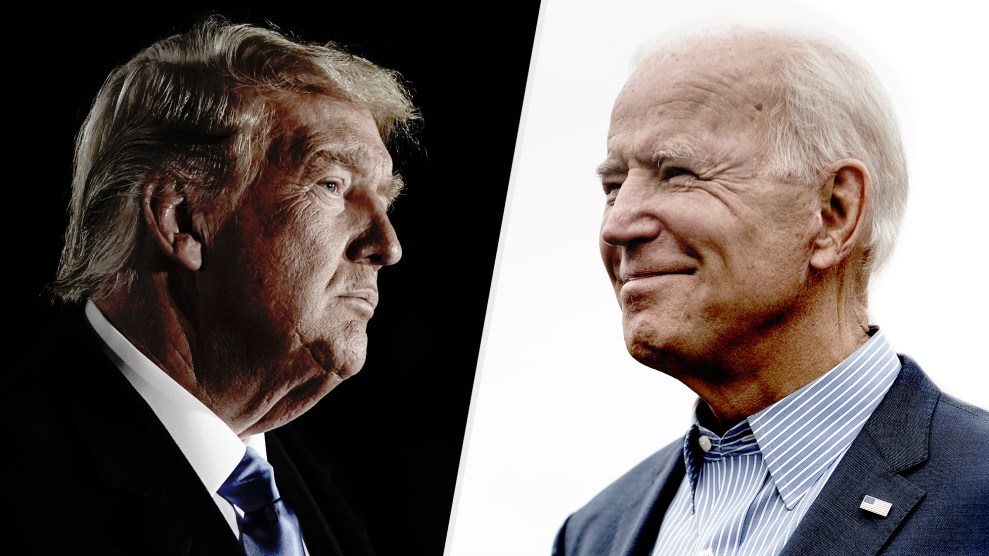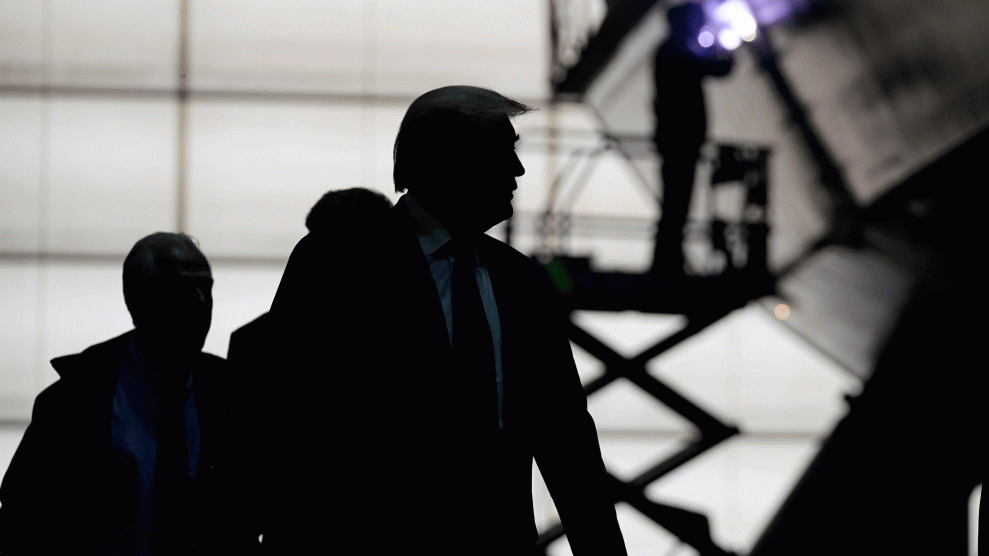
Mother Jones illustration; Ken Cedeno/CNP/ZUMA, Brian Cahn/ZUMA
It always sounded hokey, but it was an accurate description of the 2020 election: a fight for the nation’s soul.
Joe Biden adopted this as his catchphrase when he entered the campaign. But whether he were in the race or not, this shorthand would have aptly framed the contest. Since moving into the White House, Donald Trump, the first reality-show president, has debased the country with his bigotry, divisiveness, and demagoguery. And to make literally everything worse, his brazen incompetence, willful ignorance, and pathological narcissism shaped an inept response to a national disaster that has resulted in over 230,000 American deaths and widespread economic calamity affecting millions. The driving question of 2020 had to be: would the voters of the United States accept this? What would it say about the country if they did?
Trump has been a power-abusing, corruption-embracing, mean-spirited, racist president who has sought to inflame partisan anger and anxiety. He has ruled by resentment. He has governed by grievance. He has whipped up hatred. He has lied constantly and excessively. He has exhausted the country. His list of offenses can and does full entire books. Our individual memories are insufficient to hold the full catalogue of outrages. Praising the “very fine people” at a white supremacist rally. Attacking journalists as the “enemy of the people.” Aiding and abetting Vladimir Putin’s attack on American democracy. Retweeting a “white power” video. Pardoning accused or convicted war criminals. Encouraging violence. Inciting fear. (Hordes of immigrants, Antifa, BLM protesters, low-income folk—take your pick—are invading the suburbs!) Promoting nepotism. Exploiting and personally profiting from government service. Covering up conflicts of interest. Trashing transparency and avoiding accountability. Violating the Constitution (see the emoluments clause). Demanding the arrest of political foes. Obstructing investigations. Undermining the legitimacy of elections.
None of this has anything to do with policy. But Trump has also committed cruel acts of governance. His administration has been trying to yank health insurance from millions of Americans, including those with pre-existing conditions. He passed a tax cut that favored the well-heeled and shafted middle- and lower-income Americans. He ripped up significant environmental safeguards and reversed steps to counter actions necessary to address climate change and its awful consequences. He praised and palled around with corrupt autocrats and murderous dictators. (He protected Saudi Crown Prince Mohammad bin Salman after MBS was accused of orchestrating the murder of Washington Post columnist Jamal Khashoggi.) He tried to impose a ban on Muslim travelers to the United States. He attempted to remove protections afforded to the Dreamers, rendering them susceptible to deportation. He separated families, placed children in cages, and orphaned hundreds. Other presidents have adopted conservative and misguided stances. Trump does not stand out in this regard. But his unending war on decency and democratic norms—coupled with his affinity for authoritarianism—places him in a category apart from other chief executives. In this way, Trump is a threat to the American experiment, as deeply imperfect as it has been.
Trump’s presidency has been fueled by gaslight. Every day he is a con man peddling fibs, falsehoods, and fabrications. His currency is snake oil and fake remedies. That has especially (and lethally) been the case during the coronavirus crisis. He has prevaricated about the pandemic nonstop. He downplayed its severity, claimed it wouldn’t last, and promoted treatments that were bunk. He placed his own political interests ahead of the well-being of his fellow citizens. And he betrayed the public with more than just his rhetoric. He failed to take the necessary and basic steps that could have saved tens of thousands of lives, maybe more. Worse, he scoffed at safety measures including mask-wearing and social distancing. Even worse than that, he insisted on holding events at the White House and on the campaign trail that posed a super-spreading threat and placed his own supporters and comrades in jeopardy.
It was as if Trump was on the side of the virus. He rarely expressed empathy for those Americans suffering and dying. In fact, in the closing weeks of the campaign, he signaled he was tired of all this COVID-19 stuff. He stopped meeting with his public health advisers (whose guidance he had long rejected), and in his campaign speeches he mocked the media for covering the rising numbers of COVID-19 cases across the country. The pandemic that still endangered the nation was, for Trump, just a bummer.
Here was a president essentially abandoning the country in its time of great need, in the midst of a tremendous threat. “I don’t take responsibility at all.” “It affects virtually nobody.” “If I can get better, anyone can get better.” Trump could not stop with the irresponsible, dumb, and misleading remarks about this national emergency. Shortly before the election, Trump’s oldest son appeared on Fox News and proclaimed COVID-19 deaths were down to “almost nothing.” That day, 1047 coronavirus deaths were recorded. And the next morning, Trump himself tweeted that deaths were “WAY DOWN.” That was utterly false. As one study found, Trump was the single largest spreader of disinformation about the pandemic.
Trump was doing the exact opposite of what a president ought to do. He wasn’t protecting the public. He was endangering it. He could not hide his brazen disregard for public health, science, and…you. He was assailing common sense and rationality. He was peddling false information that kills.
Yet, even though thousands were dying every week from COVID-19 and millions of Americans remained in desperate financial straits, Trump was in a competitive position in the 2020 face-off. He trailed in many of the polls, but he still had a shot at reelection. For tens of millions of voters, his deadly negligence and incompetence, as well as his assaults on fundamental democratic and civil values, were not disqualifications. They relished his dark and perverted view of the world. They were jazzed by his race-baiting. They were moved by his fear-mongering. They bought his paranoid and outlandish conspiracy theories (the Deep State was after him, doctors were hyping COVID death numbers to make money). They cheered his crudeness and cruelty. They got a rush from his attacks on experts. Moreover, they believed him. Whatever he said. And they were willing to follow Trump down his trail of egotism and idiocy.
As has been widely noted, Trump has turned the Republican Party into a death cult. But this is not only a problem for the GOP. The millions who have eagerly joined Trump’s cult of personality reflect deep currents within American society. They are part of the national soul. So Biden is right. If they emerge triumphant once more—whether through honest counting or through trickery and suppression—this will be a verdict on the basic nature of the country and, perhaps, its democratic machinery.
When a first-term president seeks another four years, the election is usually a referendum on him. That’s been more true than ever in 2020. The Trump campaign has strived mightily to make Biden the issue, cooking up a variety of fake and ludicrous controversies: his alleged infirmity, his supposed allegiance to “the radical left,” and unproven accusations of Biden family corruption. Not much has stuck. Desperate last-minute efforts to orchestrate an October Surprise fizzled. This election is about Trump. Biden is a known—maybe too well-known—quantity. He didn’t need to introduce or prove himself to most voters. Once the pandemic struck, he acted responsibly and campaigned modestly. He was a safe alternative, even if he wasn’t inspiring. But who needs inspiration during a public health care crisis? Competence will do just fine.
At the start of the race, Biden presented himself as the antidote to Trump the self-serving, hate-hurling thug. He pitched the narrative that he is a decent, caring, and hard-working fellow from Scranton who believed that even congressional Republicans could be reached, on occasion, with reason and a plea for the greater good. It seemed a bit quaint, this notion that Biden could dispatch Trump and lead the country to an era of good feeling and cooperation. “We’re better than this, Biden insisted, sometimes sounding like he was propelled more by wishful thinking than the recognition of reality. Folks on Twitter especially mocked Biden for his old-fashioned belief that once Trump was out of the way, he could sit down with Mitch McConnell and other Republicans and, like gentlemen and gentleladies, work out the nation’s differences and together solve the problems that ail the United States.
Biden didn’t seem to grasp that the soul trouble of the nation was not the result of one loud-mouth former celebrity. Prevailing in this battle would entail more than the defenestration of a single president. The darkness infecting the country extended to an entire political party that was no longer the GOP that Biden fondly recalled—and to millions of Americans who had accepted and craved the know-nothingism and hostility of Trump and Trumpism.
If a pandemic had not descended upon the United States, Biden’s “soul of the nation” pitch—which did not help him in the earliest rounds of the Democratic Party’s presidential primary contest—might have worn thin. But Trump’s inept response to the horrific coronavirus crisis showed that what Americans need most is a leader who could effectively tend to their health and safety. And Trump’s erratic, detached, tribalized, it’s-about-me, facts-don’t-matter approach to the pandemic demonstrated that body and soul were one during this emergency. His demagogic and divisive mismanagement cast a sharp light on the most troubling aspects of his character and his presidency. Now his bluster, dishonesty, ineptitude, and narcissism were killing Americans. The troubled man who had vowed in his inaugural speech that “this American carnage stops right here” was responsible for a level of carnage unseen in the United States for a century.
Reality proved to be a killer for Trump. He had always bullshitted his way to success. And he and his minions were prepared to pooh-pooh Biden’s critiques of Trump’s character as those of a sniveling weakling and career politician who couldn’t match Trump’s fortitude and fierceness. But the rising death count and the continuing economic disaster made Biden’s case: Trump’s flaws had consequences. This was not just a question of style. Trump represented the worst qualities of the nation (and of human nature), and Americans were dying because he was in power.
So this election is indeed a reality check. Do most voters—and do enough voters in swing states—recognize the realities of Trump’s fake presidency? He has spread a deadly strain of authoritarianism, animus, and ignorance within the US government and American society. Will the body politic now expel this virus? Are the antibodies strong enough?
There are sharp policy differences galore between Trump and Biden. One is aiming to throw millions off their health insurance; the other wants to expand health care coverage. One shouts “law and order” in the face of police brutality and racial injustice, the other proposes steps to address these challenges. One touts tax cuts for his rich friends, the other vows to redress economic inequality. Climate change, gun violence, reproductive rights, immigration, education, nuclear nonproliferation—run through the list; they hold starkly opposing positions. Much of this is the usual R-versus-D stuff. But in the 2020 showdown, more is on the table. What is being tested in this election is whether the Trump infection and this democracy’s slide toward authoritarianism and kleptocracy can be beaten back. Trump and Biden are on the ballot, but the nation’s character is on the line.
















